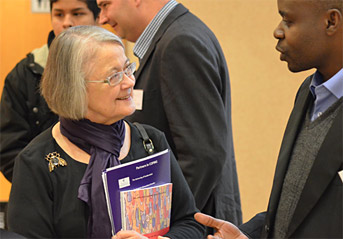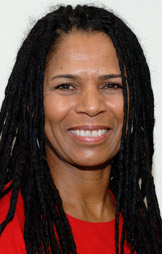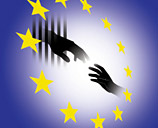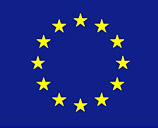Plight of children with parents in prison
Thu, 20 Dec 2012 18:23:00 GMT
Conference calls for new measures to prevent damage to the mental health of 200,000 youngsters
 UK Supreme Court judge Baroness Hale at the conference in Brussels
UK Supreme Court judge Baroness Hale at the conference in Brussels
AT least 200,000 children in Europe may be at risk of suffering mental health problems because of the issues they face when they have a parent in prison. Now a large-scale research project run by experts at the University of Huddersfield has held a major conference in Brussels. It has led to calls for new levels of provision, such as child-friendly visiting centres, to be made for youngsters with jailed fathers or mothers.
Delegates heard that in the EU at any time there are some 800,000 children with an imprisoned parent. It is estimated that a quarter of them may be at risk of damage to their mental health because of stigma, family break-up and loss. This is greater than the number of youngsters affected by parental divorce.
 UK Supreme Court judge Baroness Hale attended the Brussels conference, organised by the project, which is named COPING. The Baroness is a patron of the project. Afterwards she said: “All in the criminal justice, social welfare and education fields should recognise the needs of this group of children and make proper provision for them.”
UK Supreme Court judge Baroness Hale attended the Brussels conference, organised by the project, which is named COPING. The Baroness is a patron of the project. Afterwards she said: “All in the criminal justice, social welfare and education fields should recognise the needs of this group of children and make proper provision for them.”
COPING – which stands for Children of Prisoners, Interventions and Mitigations to Strengthen Mental Health – is a three-year project, funded by the European Union (FP7 Framework), that has gathered evidence from over 1,500 children of imprisoned parents in the UK, Sweden, Germany and Romania, carers and stakeholders. The project has been run by a five-strong operational group at the University of Huddersfield. Its scientific co-ordinator is Professor Adele Jones (pictured right), who heads the University’s Centre for Applied Childhood Studies.
Key findings
COPING organised a conference in Brussels to reveal the project’s findings and make policy recommendations. Experts from organisations that included the United Nations, the World Health Organisation, UNICEF and the European Commission were among those who took part in discussions.
Key findings were:
- 25 per cent of children with a parent in prison are at risk of mental health problems.
- Children may often be disturbed and confused, particularly during the arrest, trial and early stages of imprisonment.
- Care-giving parents and extended family are important as is how openly they talk to the children about imprisonment.
- Schools can provide help with schoolwork, emotional support and counselling.
- Good quality prison contact with their prisoner parent is central to children’s resilience.
Recommendations included:
- Police arrest and search policies and procedures should reflect the UN Convention on the Rights of the Child.
- Courts should consider the child’s best interests when sentencing.
- Prisons should provide child-friendly visiting centres.
- Schools should identify children of prisoners in ways that are discreet and non-stigmatising.
- Professionals should be prepared to give parents and care-givers advice and support on telling children about the imprisonment of their parent.
- The vital role of care-giving parents, grandparents and siblings should be recognised and supported.
 The Brussels conference opened with speeches from Baroness Hale, plus UK MEP Jean Lambert and the Deputy Ombudsperson for Children Croatia, Maja Gabelica Supljika.
The Brussels conference opened with speeches from Baroness Hale, plus UK MEP Jean Lambert and the Deputy Ombudsperson for Children Croatia, Maja Gabelica Supljika.
Baroness Hale stressed the importance of the UN Convention on the Rights of the Child with respect to children affected by parental incarceration. Jean Lambert added: “I don’t think that the children whose parents are in prison are taken into consideration in terms of resources, attitudes and awareness at the EU level.”
 Maja Gabelica Supljika was instrumental in raising awareness of the issue of children of prisoners in Croatia, demonstrating the key role that the Children’s Ombudspersons throughout Europe can play in garnering support for these children.
Maja Gabelica Supljika was instrumental in raising awareness of the issue of children of prisoners in Croatia, demonstrating the key role that the Children’s Ombudspersons throughout Europe can play in garnering support for these children.
In addition to presentations from researchers and organisations involved in the COPING project, a panel of young people from Sweden and the UK presented their own recommendations for policymakers.
 They stressed the importance of children and young people being fully informed about what is happening to their parent, where he or she is imprisoned and when they will be freed.
They stressed the importance of children and young people being fully informed about what is happening to their parent, where he or she is imprisoned and when they will be freed.







